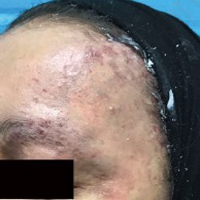Nd:YAG laser in association with pulsed dye laser for the treatment of PHACES syndrome

Accepted: 25 November 2020
HTML: 2
All claims expressed in this article are solely those of the authors and do not necessarily represent those of their affiliated organizations, or those of the publisher, the editors and the reviewers. Any product that may be evaluated in this article or claim that may be made by its manufacturer is not guaranteed or endorsed by the publisher.
The acronym PHACES stands for posterior fossa malformations, hemangiomas, arterial anomalies (cardiovascular or cerebrovascular), coarctation of the aorta/cardiac defects, eye abnormalities, and sternal defects. The characteristic dermatological clinical manifestation of PHACES syndrome is a segmental and extensive hemangioma, usually on the face. A combined therapy with 1,064 nm Nd-YAG/595-nm pulsed dye laser was performed in a young 15-year-old patient with PHACES syndrome, who presented a hemangioma on the left side of the face, located in the periorbital region. A first session with Nd-YAG laser (2,5 mm spot size, fluence 100 J/cm2, pulse duration 7 ms) for the treatment of teleangectasias and subsequently, three treatment sessions with pulsed dye laser (12 mm spot size, fluence 7 J/cm2, pulse duration 0,5 ms, repetition rate 0,6 Hz), once every 2 months, were performed. No postoperative complications were recorded, except for transient purpura after the pulsed dye laser sessions. The vascular lesion had a decrease in size bigger than 75%, and these results was maintained 6 months after the last treatment. Combined therapy Nd- YAG/pulsed dye laser is an effective and noninvasive procedure for hemangiomas in patients with PHACES syndrome.
Haggstrom AN, Lammer EJ, Schneider RA, Marcucio R, Frieden IJ. Patterns of infantile hemangiomas: new clues to hemangioma pathogenesis and embryonic facial development. Pediatrics. 2006;117:698–703 DOI: https://doi.org/10.1542/peds.2005-1092
Chiller KG, Passaro D, Frieden IJ. Hemangiomas of infancy: clinical characteristics, morphologic subtypes, and their relationship to race, ethnicity, and sex. Arch Dermatol. 2002;138:1567–1576 DOI: https://doi.org/10.1001/archderm.138.12.1567
Winter PR, Itinteang T, Leadbitter P, Tan ST. PHACE syndrome--clinical features, aetiology and management. Acta Paediatr. 2016 Feb;105(2):145-53. DOI: https://doi.org/10.1111/apa.13242
Hartmann F, Lockmann A, Grönemeyer LL et al. Nd:YAG and pulsed dye laser therapy in infantile haemangiomas: a retrospective analysis of 271 treated haemangiomas in 149 children. J Eur Acad Dermatol Venereol. 2017 Aug;31(8):1372-1379. doi: 10.1111/jdv.14074. Epub 2017 Jan 23. DOI: https://doi.org/10.1111/jdv.14074
Tanzi EL, Lupton JR, Alster TS. Lasers in dermatology: four decades of progress. J Am Acad Dermatol. 2003;49:1–31. quiz 31-34. DOI: https://doi.org/10.1067/mjd.2003.582
Nisticò S, Campolmi P, Moretti S, Del Duca E, Bruscino N, Conti R, Bassi A, Cannarozzo G. Nonconventional Use of Flash-Lamp Pulsed-Dye Laser in Dermatology. Biomed Res Int. 2016;2016:7981640. DOI: https://doi.org/10.1155/2016/7981640
Cannarozzo G, Negosanti F, Sannino M et al. Q-switched Nd:YAG laser for cosmetic tattoo removal. Dermatol Ther. 2019 Sep;32(5):e13042. DOI: https://doi.org/10.1111/dth.13042
Del Duca E, Zingoni T, Bennardo L et al. Long-Term Follow-Up for Q-Switched Nd:YAG Treatment of Nevus of Ota: Are High Number of Treatments Really Required? A Case Report. Photobiomodul Photomed Laser Surg. 2020 Aug 5.
Zutt M. Laser treatment of vascular dermatological diseases using a pulsed dye laser (595 nm) in combination with a Neodym:YAG-laser (1064 nm). Photochem Photobiol Sci. 2019 Jul 10;18(7):1660-1668. DOI: https://doi.org/10.1039/C9PP00079H
PAGEPress has chosen to apply the Creative Commons Attribution NonCommercial 4.0 International License (CC BY-NC 4.0) to all manuscripts to be published.





 https://doi.org/10.4081/dr.2021.8751
https://doi.org/10.4081/dr.2021.8751



